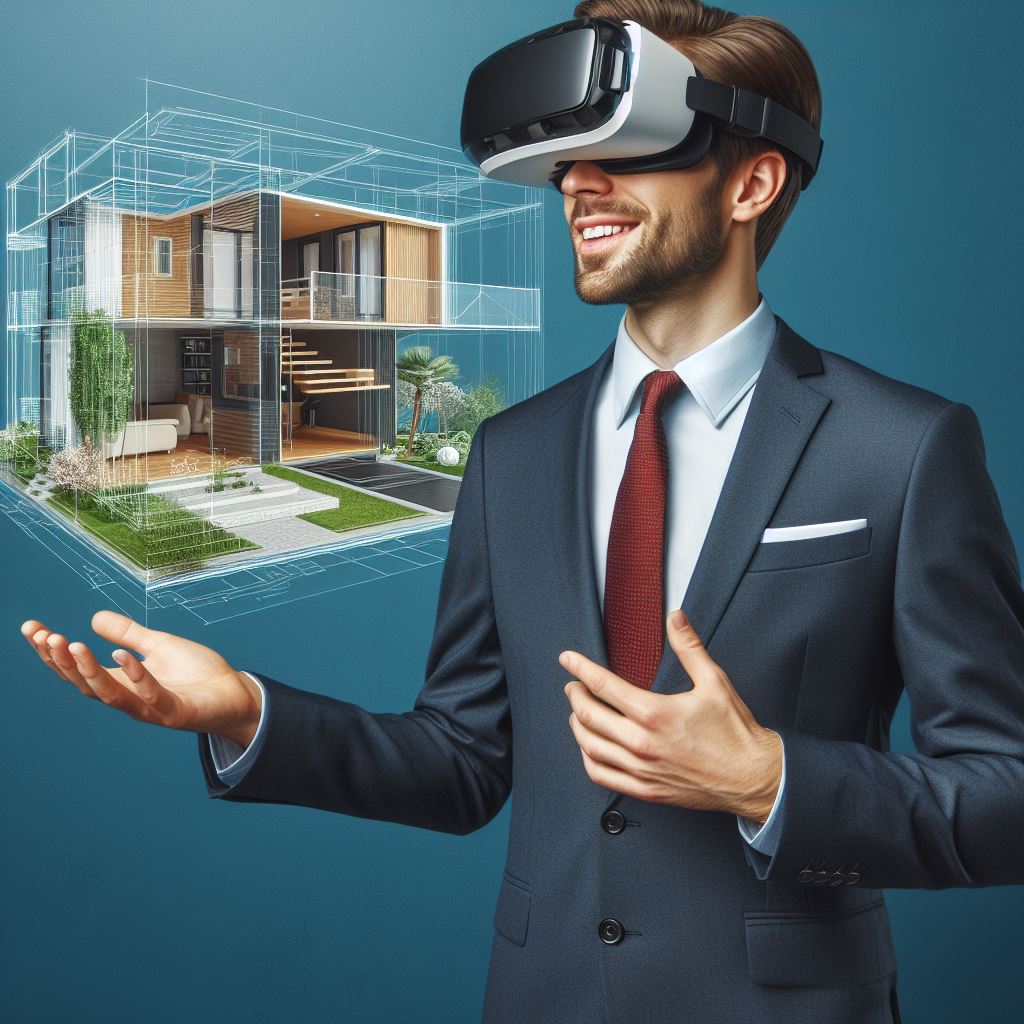Introduction
In the competitive world of real estate, open houses have historically been a crucial marketing tool.
It is an opportunity for potential buyers to physically explore a property and get a feel for its layout and ambiance.
However, as technology advances and people’s behaviors change, virtual tours are emerging as a game-changing alternative.
Virtual tours allow prospective buyers to explore properties without the need for physical presence.
It grants them the convenience of touring multiple homes from the comfort of their own space, saving time and eliminating the need for long-distance travel.
Additionally, virtual tours provide a more immersive experience through 360-degree views and detailed visuals.
The COVID-19 pandemic further accelerated the adoption of virtual tours.
With social distancing measures in place, traditional open houses became difficult to organize and attend safely.
Real estate agents quickly shifted to virtual platforms to ensure business continuity.
As a result, many buyers and sellers experienced the benefits of virtual tours firsthand.
Moreover, virtual tours offer advantages beyond convenience and safety.
They enable agents to reach a wider audience, including international buyers, and provide a cost-effective way to showcase properties.
The ability to customize virtual tours with interactive features, such as room measurements and virtual staging, enhances buyer engagement and decision-making.
As technology continues to advance, virtual tours are expected to become even more sophisticated.
Virtual reality (VR) and augmented reality (AR) could transform the virtual tour experience by allowing buyers to virtually decorate and furnish spaces, further aiding in their visualization of a potential home.
Transform Your Real Estate Decisions
Unlock personalized real estate insights crafted just for you. Get actionable advice designed to amplify your success.
Get StartedIn essence, virtual tours are revolutionizing the open house concept.
They provide convenience, safety, and an immersive experience for buyers, while enabling agents to showcase properties more effectively.
As the real estate industry embraces new technologies, virtual tours will likely become the future of open houses.
The Rise of Virtual Tours
In recent years, virtual tours have emerged as a revolutionary tool in the real estate industry.
A. Definition of virtual tours
Virtual tours are interactive simulations that allow viewers to experience a property remotely.
Through the use of 360-degree panoramas, videos, and images, prospective buyers can virtually explore a property.
B. Their increasing popularity in the real estate market
Virtual tours provide convenience and flexibility to both buyers and sellers.
They eliminate the need for physical visits, saving time and money for all parties involved.
Buyers can view multiple properties in a shorter span of time, widening their options.
Sellers can attract a larger pool of potential buyers from anywhere in the world.
The rise of virtual tours has transformed the way people buy and sell real estate.
Buyers can now explore properties without leaving the comfort of their homes.
They can navigate through each room, examine details, and get a realistic sense of the space.
This immersive experience allows buyers to make more informed decisions.
Showcase Your Real Estate Business
Publish your company profile on our blog for just $200. Gain instant exposure and connect with a dedicated audience of real estate professionals and enthusiasts.
Publish Your ProfileReal estate agents benefit from virtual tours as well.
They can showcase properties to a broader audience and maximize their marketing efforts.
Virtual tours provide an opportunity to highlight unique features and attract potential buyers.
Furthermore, virtual tours save time for agents by minimizing the number of in-person showings.
C. Statistics or examples highlighting the growth and impact of virtual tours
A survey conducted by the National Association of Realtors found that 40% of buyers used virtual tours.
Real estate agents report an increase in leads and sales with the use of virtual tours.
Realtor.com states that listings with virtual tours receive 87% more views than those without.
According to Redfin, properties with virtual tours sell 20% faster than traditional listings.
Virtual tours have also become a valuable asset for international buyers and investors.
They can visualize a property they are interested in purchasing from anywhere in the world.
This is particularly valuable for those unable to travel to visit properties in person.
The impact of virtual tours on the real estate market is significant and continues to grow.
More and more real estate agencies are investing in virtual tour technology.
They recognize its ability to enhance the buying and selling processes.
Even in a post-pandemic world, where remote solutions have become the norm, virtual tours are here to stay.
Advancements in virtual reality and augmented reality will only further improve the virtual tour experience.
Overall, virtual tours have quickly become the future of open houses and have reshaped the real estate industry.
They provide convenience, flexibility, and a realistic representation of properties, benefiting both buyers and sellers.
Read: CRM Strategies to Win in Real Estate
Advantages of Virtual Tours for Buyers
Virtual tours are revolutionizing the real estate industry, transforming the way properties are showcased and experienced by potential buyers.
Through the use of advanced technology and innovative platforms, virtual tours offer a range of advantages that make them the future of open houses.
A. Convenience and accessibility
One of the key advantages for buyers is the convenience and accessibility that virtual tours provide.
With just a click of a button, buyers can explore properties at any time and from anywhere, using their smartphones, tablets, or computers.
This eliminates the need for scheduling appointments and traveling to different locations, saving both time and effort.
B. Time-saving benefits
Time-saving benefits are another significant advantage of virtual tours.
Instead of spending valuable time visiting multiple properties, buyers can virtually tour numerous homes in a single sitting.
This not only streamlines the property search process but also allows buyers to narrow down their options more efficiently.
C. Enhanced visualization and exploration of properties
Furthermore, virtual tours offer enhanced visualization and exploration of properties.
With high-quality images, 360-degree views, and interactive features, buyers can examine every room and space in detail.
They can zoom in on specific areas, examine finishes, and even measure dimensions, gaining a comprehensive understanding of the property without being physically present.
Showcase Your Real Estate Business
Publish your company profile on our blog for just $200. Gain instant exposure and connect with a dedicated audience of real estate professionals and enthusiasts.
Publish Your ProfileD. Customizability and personalized experiences
Customizability and personalized experiences are additional benefits that virtual tours bring.
Buyers have the freedom to navigate through a virtual tour based on their preferences and priorities.
They can focus on rooms they find most important, skip sections that are less relevant, and revisit areas they want to explore further.
This level of control allows buyers to tailor their experience and make more informed decisions.
E. Safety during uncertain times (e.g., COVID-19)
In today’s unpredictable times, safety is a crucial concern for buyers.
Virtual tours provide a safe alternative to traditional open houses, especially during situations like the COVID-19 pandemic.
Buyers can still explore properties while minimizing the risks associated with physical contact and social distancing measures.
Virtual tours ensure that the property search process can continue while prioritizing the health and well-being of buyers.
In fact, virtual tours offer numerous advantages for buyers in the real estate market.
From convenience and time-saving benefits to enhanced visualization and personalized experiences, virtual tours are transforming the way properties are discovered and explored.
Furthermore, virtual tours provide a safe alternative during uncertain times, ensuring that the property search process can continue uninterrupted.
As technology continues to advance, virtual tours will become an increasingly integral part of the future of open houses.
Read: Handling Client Objections Like a Pro
Advantages of Virtual Tours for Sellers and Real Estate Agents
A. Wider reach and increased exposure to prospective buyers
Virtual tours allow sellers and real estate agents to showcase their properties to a global audience.
With online platforms and social media, virtual tours can reach a larger pool of potential buyers.
Increased exposure leads to higher chances of finding the right buyer for the property.
B. Cost-effectiveness compared to traditional open houses
Virtual tours eliminate the need for physical open houses, saving sellers and agents money.
Traditional open houses involve expenses like staging, refreshments, and advertising, which can be avoided with virtual tours.
By using virtual tours, sellers and agents can allocate their budget towards other marketing strategies.
C. Time-saving benefits for real estate agents
Real estate agents no longer need to spend time and effort preparing and conducting physical open houses.
Virtual tours allow agents to accommodate more prospective buyers at their convenience, even outside regular business hours.
Agents can focus on other important tasks while virtual tours continue to showcase the properties.
D. Showcasing multiple properties without physical limitations
Virtual tours enable sellers and agents to showcase multiple properties simultaneously without the need for multiple open houses.
Potential buyers can view various properties from the comfort of their homes, increasing their options and saving time.
This advantage allows sellers and agents to present a wider range of properties, potentially attracting more buyers.
E. Collecting data and analytics for better market insights
Virtual tours provide valuable data and analytics, such as the number of views, the duration of visits, and the most viewed areas within a property.
This data allows sellers and agents to understand buyer preferences and interests, helping them make informed marketing decisions.
Analytics from virtual tours can also provide insights into market trends and help identify potential areas for improvement.
In short, virtual tours offer numerous advantages for sellers and real estate agents.
They provide a wider reach and increased exposure to prospective buyers, are cost-effective compared to traditional open houses, and save time for real estate agents.
Showcase Your Real Estate Business
Publish your company profile on our blog for just $200. Gain instant exposure and connect with a dedicated audience of real estate professionals and enthusiasts.
Publish Your ProfileVirtual tours also allow for showcasing multiple properties without physical limitations and provide valuable data and analytics for better market insights.
Embracing virtual tours in the real estate industry can revolutionize the way properties are marketed and sold.
Read: Ethical Dilemmas in Property Deals

Potential Challenges and Limitations of Virtual Tours
In addition to the numerous advantages, virtual tours also come with potential challenges and limitations that need to be considered when using them in the real estate industry.
A. Limitations in providing a true sense of the property’s layout and dimensions
Virtual tours might not fully capture the spatial aspects of a property, making it challenging for potential buyers to gauge its actual layout and dimensions accurately.
While virtual tours can offer a visually immersive experience, they might not convey the exact spatial layout and dimensions of a property.
Buyers may find it difficult to understand room proportions and how spaces connect in the absence of physically exploring the property.
B. Technical issues and learning curve for users
Virtual tours require specific technology and may face technical glitches, while users may need to learn and adapt to the virtual tour platforms.
Virtual tours require specific technology and software, which may present technical issues and compatibility problems.
Users might face challenges navigating virtual tour platforms and adjusting to the technology, particularly for those who are less tech-savvy.
C. Impact on the role of real estate agents in facilitating sales
Virtual tours can reduce the need for real estate agents, as buyers might rely solely on virtual tours to make purchasing decisions.
Virtual tours have the potential to diminish the role of real estate agents.
As buyers can remotely explore properties through virtual tours, they may feel less inclined to seek the assistance of an agent.
This shift could affect the traditional business model of real estate agents.
D. Difficulty in capturing the ambiance and emotional aspects of a physical open house
The emotional connection and ambiance created during physical open houses are challenging to replicate through virtual tours.
Virtual tours lack the ability to capture the atmosphere and emotional appeal of a physical open house.
The sensory experience, such as feeling the natural light or admiring the surrounding neighborhood, is challenging to replicate through a virtual tour.
While virtual tours offer convenience, accessibility, and cost-effectiveness, these limitations must be acknowledged.
It is important for both buyers and sellers to understand that virtual tours may not provide a complete representation of a property.
Real estate professionals need to address these challenges by finding innovative ways to enhance virtual tours.
This can include providing detailed floor plans, incorporating interactive features for better spatial understanding, and utilizing advanced technology such as virtual reality to enhance the immersive experience.
Moreover, while virtual tours may reduce the need for physical open houses, they can be used as a complementary tool rather than a complete replacement.
Real estate agents can leverage virtual tours to pre-screen potential buyers and narrow down the pool of interested parties before organizing in-person visits.
By doing so, agents can save time and effort for both buyers and sellers.
Overall, despite their limitations, virtual tours have revolutionized the real estate industry and will likely become an integral part of future open houses.
By addressing the challenges, real estate professionals can maximize the potential benefits of virtual tours for both buyers and sellers alike.
Read: Legal Tips for First-Time Home Sellers
Current Examples and Success Stories of Virtual Tours
In the fast-evolving landscape of real estate, virtual tours have emerged as the game-changer, revolutionizing traditional open houses.
Let’s delve into compelling examples and success stories that showcase the immense potential of virtual tours.
A. Real Estate Companies Leading the Way
- Zillow‘s Immersive Listings: Zillow has set the benchmark by seamlessly integrating virtual tours into their property listings. Prospective buyers navigate through properties at their own pace.
- Innovative Approaches by Dream Homes Inc.: Dream Homes Inc. takes virtual tours a step further by incorporating interactive elements. Buyers can virtually customize spaces, envisioning their dream home with a click.
- Individual Agents Embracing Technology: Forward-thinking agents like Sarah Johnson have personally embraced virtual tours. Sarah utilizes 360-degree video walkthroughs, providing a personalized touch even in the digital realm.
B. Positive Feedback and Testimonials from Buyers
- The Smiths’ Home-Buying Journey: Mr. and Mrs. Smith, after experiencing a virtual tour, expressed how it saved them time and energy.
“It felt like we were actually walking through the house!” - John’s Remote Property Purchase: Living miles away didn’t hinder John’s home-buying process.
Through virtual tours, he confidently selected his dream home, sharing, “It bridged the gap between us and the property.” - Enhanced Decision-Making for the Millers: The Millers appreciated the convenience of revisiting a property virtually.
“We made an informed decision, comparing multiple homes without stepping out,” they shared.
C. Realtor Recognition and Industry Accolades
- Virtual Tours Recognized at Real Estate Awards: Industry awards, such as the Real Estate Innovation Awards, have acknowledged pioneers using virtual tours. Recognition fuels a culture of innovation among real estate professionals.
- Increased Client Satisfaction: Realtors adopting virtual tours report heightened client satisfaction. The efficient showcasing of properties leads to quicker transactions, solidifying the positive impact of virtual tours on the bottom line.
In a nutshell, these examples and testimonials underscore the transformative power of virtual tours.
Showcase Your Real Estate Business
Publish your company profile on our blog for just $200. Gain instant exposure and connect with a dedicated audience of real estate professionals and enthusiasts.
Publish Your ProfileAs we witness a paradigm shift in real estate, it’s clear that virtual tours are not just a trend but the future of open houses.
Predictions for the Future of Open Houses
A. Long-term impact of virtual tours on the real estate industry
Virtual tours have the potential to revolutionize the way open houses are conducted in the future.
With advancements in technology, buyers will be able to explore properties from the comfort of their own homes.
Imagine being able to take a virtual tour of a potential home without leaving your couch.
Virtual reality and augmented reality technologies will allow buyers to virtually walk through a property, giving them a realistic sense of the space.
This technology will provide an immersive experience, allowing buyers to visualize themselves living in the property.
It will eliminate the need for physical open houses and reduce the time and effort involved in visiting multiple properties in person.
Furthermore, virtual tours can save both buyers and sellers valuable time.
Instead of spending hours driving to various open houses, buyers can quickly narrow down their options by exploring properties virtually.
Sellers, on the other hand, can reach a wider audience through virtual tours.
They can showcase their properties to potential buyers from around the world, expanding their reach beyond their local market.
B. Potential advancements in virtual reality and augmented reality technologies
As virtual reality and augmented reality technologies continue to evolve, the future of open houses will become even more exciting.
We can expect to see improvements in the quality of virtual tours, with more realistic graphics and seamless navigation.
Advancements in virtual reality headsets and devices will make the experience even more immersive.
Buyers will feel like they are actually walking through the property and will be able to interact with the virtual environment in a more intuitive manner.
Augmented reality, on the other hand, will allow buyers to overlay virtual elements onto the real world.
For example, they can visualize how their furniture would look in the space or see potential renovations before making a decision.
C. Evolving role of real estate agents in adapting to virtual tours
With the rise of virtual tours, real estate agents will need to adapt to the changing landscape of the industry.
While virtual tours can provide buyers with a comprehensive view of a property, there is still a need for the expertise of a real estate agent.
Real estate agents will play a crucial role in guiding buyers through the virtual tour process and providing additional information about the property.
They can offer insights into the neighborhood, answer questions, and facilitate negotiations.
Additionally, real estate agents can use virtual tours as a marketing tool.
They can create highly engaging and interactive virtual tours to showcase their listings and attract potential buyers.
D. Role of online platforms and virtual marketplaces
The future of open houses will also see a reliance on online platforms and virtual marketplaces.
These platforms will provide a central hub for buyers, sellers, and real estate agents to connect and conduct virtual tours.
Buyers will be able to access a wide range of properties and filter their search based on their preferences.
They can schedule virtual tours, communicate with sellers and agents, and even make offers through these platforms.
Virtual marketplaces will allow sellers to list their properties and showcase them through virtual tours.
They will provide a convenient and efficient way for sellers to reach potential buyers and receive offers.
In review, the future of open houses will be transformed by virtual tours.
Showcase Your Real Estate Business
Publish your company profile on our blog for just $200. Gain instant exposure and connect with a dedicated audience of real estate professionals and enthusiasts.
Publish Your ProfileAdvancements in technology, such as virtual reality and augmented reality, will provide a more immersive and realistic experience for buyers.
Real estate agents will play a vital role in adapting to this change and utilizing virtual tours as a marketing tool.
Online platforms and virtual marketplaces will serve as the central hub for buyers, sellers, and agents to connect and conduct virtual tours. Exciting times lie ahead for the real estate industry!
Conclusion
A. Recap of the advantages and potential challenges of virtual tours
- Virtual tours provide convenience, as potential buyers can explore properties remotely.
- They offer a realistic and immersive experience, allowing individuals to virtually walk through a property.
- Virtual tours save time and resources for both real estate agents and potential buyers.
- They can help attract a larger audience, including international buyers and busy individuals.
- However, potential challenges include technical difficulties and the lack of personal interaction.
Restating the thesis statement: Virtual tours present a promising future for open houses in the real estate industry.
B. Encouraging readers to embrace and explore virtual tours in the real estate market
Embracing virtual tours can revolutionize the way we buy and sell properties, offering convenience and efficiency.
It is important for real estate professionals and buyers to actively engage in this technology-enabled approach.
C. Call-to-action for further research or inquiries about virtual tours in the local real estate market
If you are interested in learning more about virtual tours and their benefits, reach out to local real estate agents or conduct your own research to understand the potential of virtual tours in the real estate market.




